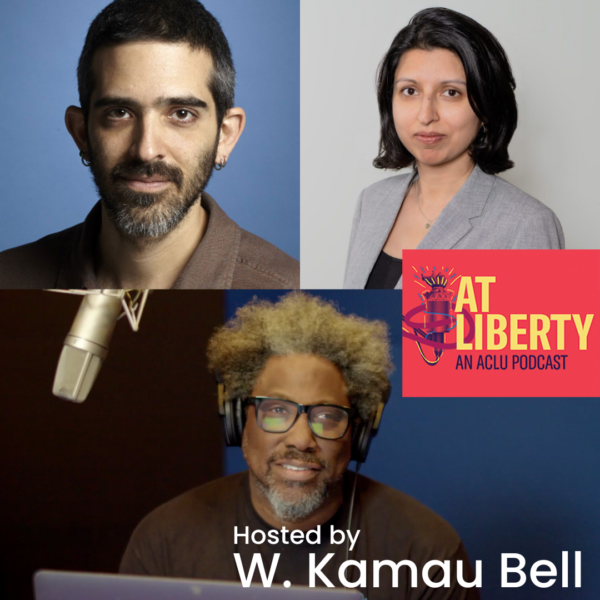At Liberty Podcast

Nicole Ozer, the Technology and Civil Liberties director for the ACLU of California, has been at the forefront of debates around privacy and technology for more than 15 years. She joins At Liberty to break down the current state of facial recognition technology and why it raises civil rights and civil liberties concerns.
This Episode Covers the Following Issues
Related Content
- Press ReleaseApr 2025

Privacy & Technology
+2 Issues
Human Rights First Joins Aclu And Nyclu In Amicus Brief To Protect First Amendment Rights And Interests Of Ngos Advocating For U.s. Sanctions. Explore Press Release.Human Rights First Joins ACLU and NYCLU in Amicus Brief to Protect First Amendment Rights and Interests of NGOs Advocating for U.S. Sanctions
Today, Human Rights First, the American Civil Liberties Union (ACLU), and the New York Civil Liberties Union (NYCLU) filed an amicus brief with the U.S. District Court for the Eastern District of New York, in support of Democracy for the Arab World Now’s (DAWN) efforts to block an individual sanctioned for violence in the Israeli occupied West Bank from accessing information about DAWN’s advocacy for sanctions against him. The brief argues that various protections, including the First Amendment and reporter’s privilege, bar the court from granting the discovery requested in this case. The brief also emphasizes how such discovery requests, if granted, would put civil society groups at serious risk of irreparable harm and chill their vital advocacy work on human rights and corruption issues. In August 2024, Isaac Levi Pilant was sanctioned by the U.S. government under the West Bank sanctions program, for attacking and forcefully expelling Palestinians from a West Bank settlement. At the time, human rights groups, media outlets, and witnesses had documented Pilant’s alleged role in violent attacks against Palestinians, and DAWN had publicly recommended that the U.S. government impose sanctions on him and others for such violence. The sanctions against Pilant were lifted in January 2025, after President Trump effectively terminated the West Bank sanctions program. Pilant then filed an application against DAWN and its executive director, Sarah Leah Whitson, pursuant to a U.S. law that provides a mechanism for foreign litigants to obtain discovery from people and entities in the United States.The application seeks a court order for information related to DAWN’s investigation of Pilant and its sanctions advocacy efforts. Pilant says he seeks the information for use in a possible future defamation case in Israel against an Israeli human rights organization. The brief explains how the U.S. government has established frameworks and processes to encourage nongovernmental organizations (NGOs) to share sensitive information that can assist it in more effectively implementing various human rights and corruption sanctions and visa restriction programs. Undermining the protections for NGOs to securely and confidentially share this information would not only impact the ability of the U.S. government to use such tools to hold human rights abusers and corrupt actors accountable, but it would also put NGOs, victims of abuse, and others in civil society in jeopardy by opening them up to retaliation and harassment from people they accuse of human rights violations. “Human rights and corruption sanctions are impactful tools of accountability because they threaten the reputations and financial interests of abusers. Forcing NGOs to share information about their sanctions advocacy would put them at grave risk of violence and retaliation from repressive governments and powerful private individuals,” said Amanda Strayer, Senior Counsel for Accountability at Human Rights First. “U.S. courts should not become a forum for sanctioned actors to harass and seek retribution against civil society groups that advocate for measures to hold them accountable.” The brief also argues that Pilant’s broad discovery request implicates information protected under the First Amendment and the reporter’s privilege, which provide grounds to reject his request under the Section 1782 statute. Supreme Court precedent requires the Court to give weight to the serious First Amendment and policy considerations before granting such a request. In this case, these considerations should result in the Court denying Pilant’s discovery request. “It is the nature of human rights reporting that it often draws the ire of accused human rights violators. But the law is clear that such individuals cannot coopt U.S. courts in an attempt to harass and endanger human rights organizations and the victims of abuses whose stories they safeguard. That’s why this is an easy case, and we hope the court has no trouble concluding that the First Amendment protects DAWN’s rights to free speech and association, and bars enforcement of the meritless request for intrusive discovery,” said Nathan Freed Wessler, Deputy Director of the ACLU Speech, Privacy, and Technology Project. “NGOs can play a critical role in providing accountability for human rights abuses, and the Constitution protects them from being forced to reveal certain confidential aspects of that work,” said Bobby Hodgson, assistant legal director at the New York Civil Liberties Union. “DAWN is being targeted by a foreign litigant implicated in serious human rights violations in an effort to weaponize our court system to silence critics. We urge the court to reject these requests and recognize that the discovery process does not create an end run around the First Amendment.”Court Case: In Re: Application of Isaac Levi Pilant, for an Order Pursuant to 28 U.S.C. § 1782 to Conduct Discovery for Use in a Foreign ProceedingAffiliate: New York - PodcastApr 2025

Free Speech
Privacy & Technology
Know Your Digital Privacy Rights With Esha Bhandari And Daniel Kahn Gillmor. Explore Podcast.Know Your Digital Privacy Rights with Esha Bhandari and Daniel Kahn Gillmor
By: ACLU - Press ReleaseApr 2025

Privacy & Technology
Aclu Sues Social Security Administration And Department Of Veterans Affairs For Information About Doge Data Access. Explore Press Release.ACLU Sues Social Security Administration and Department of Veterans Affairs for Information about DOGE Data Access
WASHINGTON – The American Civil Liberties Union filed a lawsuit today to enforce a Freedom of Information Act (FOIA) request sent to the Department of Veterans Affairs (VA) and the Social Security Administration (SSA) seeking urgent transparency about the so-called Department of Government Efficiency’s (DOGE) secretive efforts to access and analyze Americans’ sensitive personal information. In its FOIA request, originally filed in February with 40+ federal agencies, the ACLU asked for any records that reveal whether DOGE or its representatives have sought or obtained access to databases containing personally identifiable information, financial records, health care data, or other sensitive government-held records of Americans. The request also sought information on DOGE’s use of artificial intelligence (AI) to analyze government data, which raises alarms about the potential for mass surveillance and politically motivated misuse of that deeply personal information. “The federal government cannot dodge accountability by ignoring our lawful demands for transparency,” said Nathan Freed Wessler, deputy director of the ACLU’s Speech, Privacy, and Technology Project. “The American people have an urgent need to know if their private financial, medical, and personal records are being illegally accessed, analyzed, or weaponized by Trump's unaccountable team of unvetted outsiders. This is doubly true for our seniors and veterans, who are at particular risk if their data has been accessed illegally.” Given the urgency of the request, the ACLU requested expedited processing, which was granted by many agencies, including the Department of Defense, the Department of Education, and the Department of Health and Human Services. The SSA declined the request for expedited processing and has failed to respond to the ACLU’s appeal, and the VA failed to act on the request altogether. “Granting DOGE access to VA data systems would not only violate federal law but it would undermine the very core of the VA mission: to care for veterans, their families, caregivers and survivors,” said Michelle Fraling, Skadden Fellow with the ACLU’s Center for Liberty. “Given the millions of veterans and family members who depend on VA benefits and services, it is imperative that we have full transparency into DOGE’s relationship with VA and any access to veteran records.” In March, a federal judge barred DOGE representatives from accessing sensitive data at the Social Security Administration. Reporting from the Washington Post, however, has suggested that DOGE personnel have gone to great lengths to try to circumvent the court order. This lawsuit in part seeks access to records outlining DOGE’s access to private, sensitive information about Social Security Administration beneficiaries. “If DOGE is forcing its way into our private data, it is forcing itself into our private lives,” said Lauren Yu, Williams J. Brennan Fellow with the ACLU’s Speech, Privacy, and Technology Project. “Congress mandated strict privacy safeguards for a reason, and Americans deserve to know who has access to their social security numbers, their bank account information, and their health records. Government actors cannot continue to shroud themselves in secrecy while prying into our most sensitive records.” The suit was filed in the U.S. District Court for the District of Columbia. You can view the lawsuit here and read more about the FOIA requests here.Court Case: U.S. DOGE Service Access to Sensitive Agency Records Systems Multiagency FOIA - PodcastMar 2025

Free Speech
+2 Issues
Free Mahmoud Khalil With Ben Wizner And Baher Azmy. Explore Podcast.Free Mahmoud Khalil with Ben Wizner and Baher Azmy
0:00
/0:01
0:01